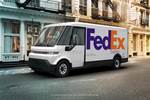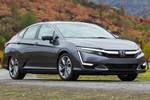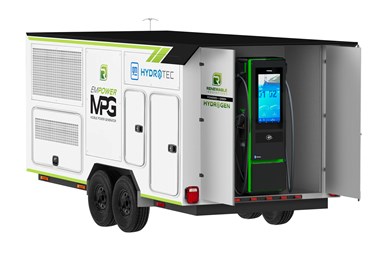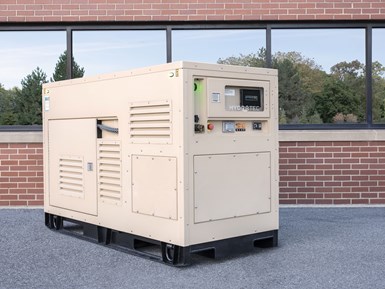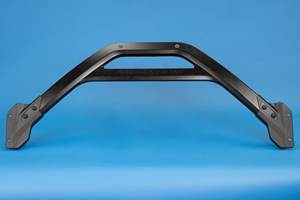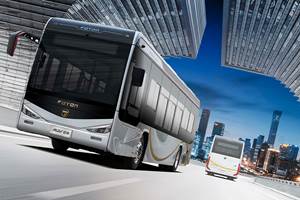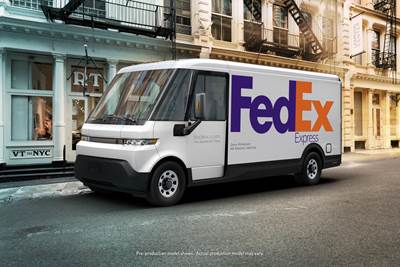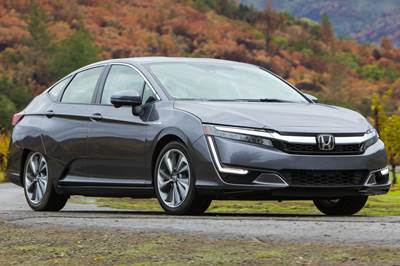General Motors plans to broaden electrification, expand fuel cells beyond vehicles
GM’s Hydrotec fuel cell technology-based mobile and fixed power systems is designed to charge EVs, power worksites, data centers, support the military and provide emergency power.
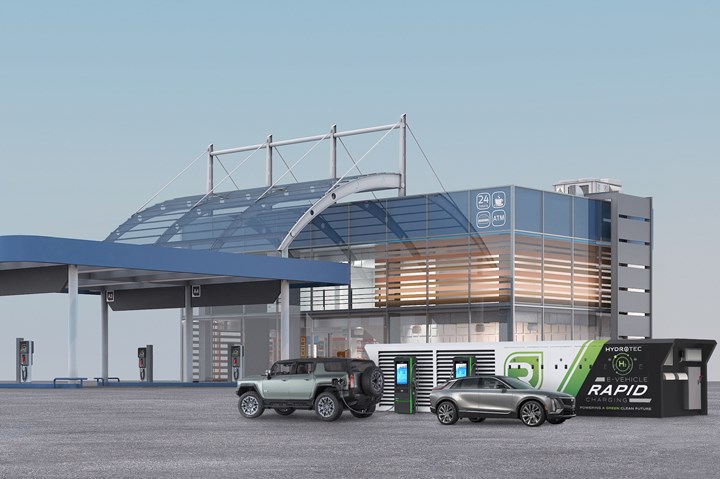
GM and Renewable Innovations are collaborating on an Empower rapid charger that can help retail fuel stations add more affordable DC fast-charging capabilities without significant investment in non-recoverable infrastructure upgrades. Photo Credit: GM
Continuing to accelerate its platform innovation growth, General Motors (GM, Detroit, Mich., U.S.) has announced new commercial applications for its Hydrotec fuel cell technology. Hydrotec projects, which are currently in development, from heavy-duty trucks to aerospace and locomotives, are being planned for use beyond vehicles for power generation.
In particular, GM is planning multiple Hydrotec-based power generators, all powered by the company’s Generation 2 Hydrotec fuel cell power cubes, including:
- A mobile power generator (MPG) to provide fast-charge capability for electric vehicles (EVs) without installing permanent charge points.
- The Empower rapid charger to help retail fuel stations add affordable DC fast charging without expanding the grid.
- A palletized MPG to quietly and efficiently power military camps and installations.
These fuel cell generators could ultimately replace gas- and diesel-burning generators, GM contends, with fewer emissions at worksites, buildings, movie sets, data centers, outdoor concerts and festivals. They could also back up or temporarily replace grid-sourced electricity for residential and small commercial enterprises at times of power disruption.
Each of these Hydrotec-based power generators feature zero-emissions electric power generation output ranging from 60 kilowatts to 600 kilowatts, along with low noise and heat signatures.
“Our vision of an all-electric future is broader than just passenger vehicles or even transportation,” says Charlie Freese, GM executive director of the global Hydrotec business. “Our energy platform expertise with Ultium vehicle architectures and propulsion components and Hydrotec fuel cells can expand access to energy across many different industries and users, while helping to reduce emissions often associated with power generation.”
GM Hydrotec and Renewable Innovations’ mobile power generator (MPG) can fast-charge EVs without having to expand the grid or install permanent charge points in places where there is only a temporary need for power. Photo Credit: GM
GM is supplying Hydrotec fuel cell power cubes to Renewable Innovations (Lindon, Utah, U.S.) to build the MPG. GM says it will combine its fuel cell hardware and software with Renewable Innovations’ power integration and management systems to create a generator that can provide fast-charging capability for EVs without having to expand the grid or install permanent charging assets in places where there’s only a temporary need for power.
Multiple development projects involving the MPG are already in process, including a demonstration of the technology as a mobile charging station for EVs, funded in part by the Michigan Economic Development Corp. and the U.S. Army Combat Capabilities Development Command Ground Vehicle Systems Center (GVSC, Warren). This version of the MPG is expected to first be demonstrated in mid-2022.
Further, California Energy Commission is funding a separate demonstration program of four additional MPGs through its Mobile Renewable Backup Generation Systems program to show how hydrogen-based mobile power can help offset the loss of energy during the planned power shutoffs used to mitigate wildfires throughout the state.
This demonstration is being led by the Electric Power Research Institute (Washington, D.C., U.S.), the preeminent independent, non-profit energy research and development organization, collaborating with stakeholders like GM and Renewable Innovations to help ensure the public has safe, reliable, affordable and equitable access to hydrogen-generated electricity.
In addition to mobile EV charging, GM and Renewable Innovations have collaborated on the Empower rapid charger. Intended to help retail fuel stations add more affordable DC fast-charging capability, the product will reportedly help deploy necessary fast charging without significant investment in nonrecoverable electrical infrastructure upgrades, like larger feed wires, transformers and potentially new substations.
GM’s prototype palletized MPG converts offboard, bulk-stored hydrogen to electricity to quietly and efficiently power military camps and installations with no emissions in operation. Photo Credit: Steve Fecht for General Motors (GM)
Empower rapid chargers can be installed at existing fuel stations or along corridors frequented by travelers only part of the year, such as near national parks or vacation destinations. Powered by eight GM Hydrotec power cubes, they consumes hydrogen from internal tanks and can DC fast charge as many as four vehicles simultaneously starting at 150 kilowatts with an estimated target full charge time of 20 minutes (actual charge times will vary based on battery condition, output of charger, vehicle settings and outside temperature). More than 100 EVs can potentially be charged by the Empower rapid charger before the unit would need to be resupplied with hydrogen.
Renewable Innovations plans to deploy 500 Empower rapid chargers across the country by the end of 2025.
Finally, GM is designing a separate, palletized version of the MPG and in partnership with GM Defense (Detroit, Mich., U.S.), will offer this and EV solutions to defense and other customers, such as the GVSC, which is currently evaluating the technology. GVSC is also exploring how this version of the MPG can power heavy-duty military equipment and camps. This prototype is equivalent in size to a 60-kilowatt generator, GM adds, and produces nearly 70% more power than traditional diesel generators. This MPG variant also contains features not typically found on diesel generators, like battery backup and output regulation.
Powered by a Hydrotec power cube, this MPG prototype converts offboard, bulk-stored hydrogen to electricity generated with no emissions in operation. It reportedly generates less noise than a conventional diesel engine at full load and emits water which can be captured and repurposed in the field.
GM will produce Hydrotec fuel cell systems using globally sourced parts at its Fuel Cell Systems Manufacturing joint venture with Honda (Brownstown, Mich., U.S.). Renewable Innovations will produce the trailer-based MPG and the larger, modular Empower rapid charger at its facilities in the Salt Lake City metro area.
Related Content
Automotive chassis components lighten up with composites
Composite and hybrid components reduce mass, increase functionality on electric and conventional passenger vehicles.
Read MoreSMC composites progress BinC solar electric vehicles
In an interview with one of Aptera’s co-founders, CW sheds light on the inspiration behind the crowd-funded solar electric vehicle, its body in carbon (BinC) and how composite materials are playing a role in its design.
Read MoreExel Composites supplies fiberglass profiles for Foton electric buses
Partnership with Chinese automotive manufacturer will see the implementation of pultruded profiles in various bus models, backed by weight savings, complex geometries and long life.
Read MoreComposites end markets: Automotive (2024)
Recent trends in automotive composites include new materials and developments for battery electric vehicles, hydrogen fuel cell technologies, and recycled and bio-based materials.
Read MoreRead Next
GM announces eVTOL, delivery vehicle concepts
During a virtual CES 2021 keynote, General Motors announced its BrightDrop electric delivery vehicle business and single-seater urban air mobility concept vehicle.
Read MoreHonda discontinues Clarity fuel cell and plug-in hybrid models
Production is ceasing August 2021 as part of a broader push to trim underperforming models and evolving strategies to sell only battery-electric and fuel-cell vehicles by 2040.
Read MoreVIDEO: High-volume processing for fiberglass components
Cannon Ergos, a company specializing in high-ton presses and equipment for composites fabrication and plastics processing, displayed automotive and industrial components at CAMX 2024.
Read More

